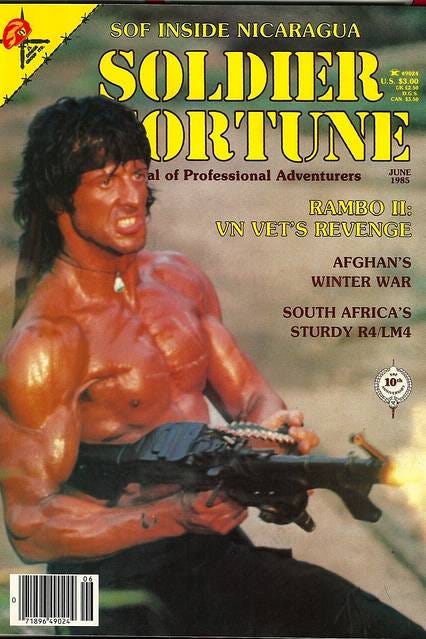Merc on Merc
Unlikely actors are outsourcing their dirty work to shady guns-for-hire. Hilarity has not ensued.

If you thought over-the-top plots involving mercenaries were just for 1980s action flicks, think again.
In May, a group of glory-seeking, QAnon-loving, guns-for-hire were arrested in Venezuela when their efforts to overthrow the Maduro government failed so spectacularly pundits jokingly called it the “Bay of Kids”. And just a few months previously, a team of twenty mercenaries fled across the Mediterranean Sea in rubber boats when an $80 million plan to deliver attack aircraft to a Libyan warlord went sour.
Modern-day mercenaries — often referred to as Private Military Contractors (PMCs) — are a mainstay on the modern battlefield. They’re an attractive alternative to “boots on the ground” because they’re politically expendable, plausibly deniable, and often come with specialized skills that can only come from years of extensive training. Smaller countries find PMCs a tempting alternative to troops, as mercenaries don’t require pesky costs associated with training, housing, health care, or veterans benefits.
The US has made extensive use of PMCs, most notably Erik Prince’s Blackwater (now known as Academi), in the decades since 9/11. Russia apparently took note and, despite its official ban on mercenaries, uses Private Military Contractors such as the Wagner Group in far-flung locales including Syria, Mozambique, and eastern Ukraine.
(The Wagner Group was created by an oligarch named Yevgeny Prighozin, better known as “Putin’s Chef”, in 2014 — the same year Prighozin also founded the Internet Research Agency, an organization indicted by the US government in 2018 for interference in the 2016 Election.)
Other countries have also gotten in on the action, using mercenaries as convenient, expendable proxies. Turkey is perhaps the worst offender, recruiting paid fighters (some of whom reportedly have links to jihadist groups) in northern Syria and offering them up to $2,000 to fight in support of Libya’s internationally-recognized government, the Government of National Accord (GNA). There, Turkish-backed mercenaries have beaten back an offensive led by Libyan warlord Khalifa Haftar, who in turn, is backed by thousands of mercenaries both on the ground as well as in Russian-supplied fighter jets.
Russia’s support for opposition leader Haftar isn’t surprising. Not only is Russia allegedly seeking a military foothold on NATO’s southern flank — one which it lost following the NATO intervention in 2011 — but Haftar’s Libyan National Army (LNA) controls south and east Libya, home to major oil reserves.
What is shocking, however, is Wagner’s alleged benefactor — a Defense Department Inspector General report accused the United Arab Emirates of sponsoring Wagner contractors. (The UAE is also implicated in the botched plot to provide Haftar with helicopters)
In other words, two nations — both of whom are major US partners in the Middle East and hosts to US bases — are backing opposing mercenary armies in Libya, with one nation backing jihadists and the other backing Russians.
(And let’s not get started on Turkey’s Syrian mercenaries in Azerbaijan fighting against Armenia in Nagorno-Karabakh. That just sounds like it was rejected from a bad military planning exercise.)
What am I drinking?
It’s back to Dragon’s Milk by New Holland Brewing. No longer on sale in 22-oz bombers in Whole Foods, I had this delivered from DC’s legendary Craft Beer Cellar straight to my doorstep via Drizly. At 11% ABV, it’ll keep you warm during the winter.
What am I playing?
Want to live the 21st-Century mercenary experience from the safety of your PC? Take to the skies in the 1993 vaporware classic Strike Commander or sponsor an insurgency in the fictitious country of Arulco in Jagged Alliance 2, released in 1999.

